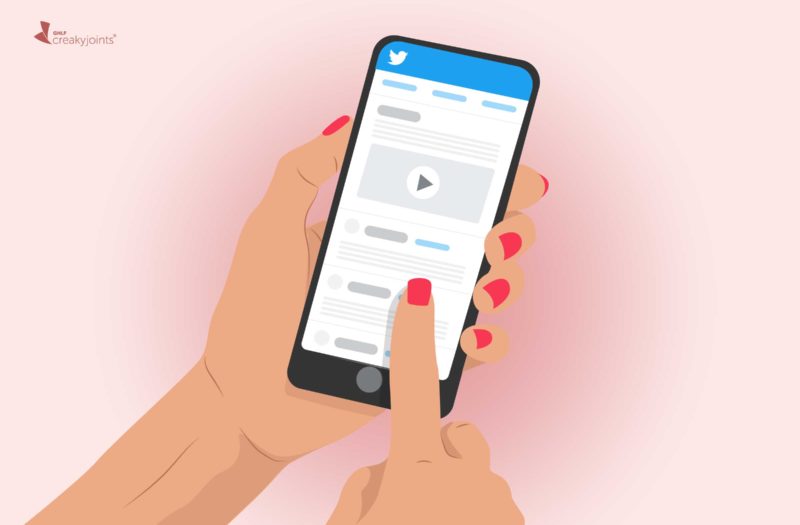

Many Americans struggle to access the health care they need for numerous reasons. Though this is an issue with national resonance, our patient community members have tangible and first-hand experience facing barriers to care. As written by @robintdake, accessing adequate care “feels like another symptom, another difficulty to handle” on top of living with a chronic illness.
Living with a chronic illness means coping with the mental, physical, and emotional upheavals that might surface on a given day — and a complex health care landscape can make life even more difficult. Navigating confusing and seemingly capricious policies robs people of their precious time and energy. Worse yet, barriers to accessing treatment compromise the health and vitality of those already struggling.
During a recent #CreakyChats, entitled “Accessibility Anxieties,” our community members shared how this issue manifests in their lives. To explore how accessibility barriers take shape in everyday form, see the responses below.
Encounters with Insurance
“It is not fair [that] insurance companies can deny treatments/medications if you don’t meet their criteria for improvement within a certain time frame. We are all different. Our bodies shouldn’t fit only one criteria.” — @authorjpsummers
“Earlier this year, a rheumatologist had to appeal an initial no from my insurance about Enbrel despite severe symptoms. It added weeks of pain but eventually it was approved.” — @MarcyPellenberg
“It took five appeals, an external review, plus me sending peer-reviewed literature to insurance to get my insurance to approve a medication I had be on for gastroparesis for two years before moving back to the U.S. [I] was forced off it for months during process and I got very sick.” — @oisforoviraptor
“Recently I switched insurance and it delayed my refills two months in a row, even though I was switching to a similar HMO plan under the same insurer. Two months in a row. I am sore, rashy, and now my left foot hurts for the first time.” — @troublemiffins
“Waiting weeks for Enbrel for my RA I felt like demonstrating to my insurance that some days I couldn’t lift my arms; other days I needed a cane to walk. Initially words didn’t seem enough to convince them.” — @MarcyPellenberg
Mental and Physical Toll of Striving to Access Care
“I feel defeated. Calling insurance and specialty pharmacies is exhausting.” — @Dividivigirl
“Dealing with insurance robs so many of us the single most valuable resource there is to a chronically ill person — energy. It literally makes us sicker.” — @oisforoviraptor
“Huge source of burnout/moral injury.” — @CrunchyAllergy
Frustrations with the Health Care System
“Access to tests, etc. are a real issue. You can’t get the best treatment without diagnosis. I was told the average time to diagnosis for a rheumatological disorder like mine is six to eight years. Do they realize how long that is?” — @MichaelKuluva
Regarding starting a new treatment and having it unexpectedly taken away due to policy changes: “It’s like starting over again. You relapse, wait for more paperwork, appeal — and the whole time you are sliding backward. There should be a transition period for other options if this occurs.” — @jgchayko
What Patients Wish Decision-Makers Knew
“I wish they could experience the symptoms they’re forcing on us for even just a day before they decide to deny. Or at least that they had to witness our grief and pain, and that of our loved ones, that is prolonged by needless bureaucracy.” — @oisforoviraptor
“I wish they knew that the decision they are making may contain biases and ingrained racism.” — @IndecentAvocado
“I would want them to step into my shoes and see how it feels to live with untreated disease, and then see how it feels when on treatment. I’m sure there would be some changes in their decision making.” — @jgchayko
The Promise of Community
“Thank you everyone for being so open. It makes me feel less alone!” — @SSkelcher
“Thank you for doing what you are doing, #CreakyChats. You help us get our stories out there, and we so appreciate it. We are more powerful together.” — @ChucklesMerk
Join Our Monthly #CreakyChats
Our monthly, patient-driven Twitter discussion, #CreakyChats, explores topics that are important to the chronic disease community. During a one-hour moderated chat, we provide a space for people to discuss pressing issues facing the arthritis/chronic disease community. You don’t need to be a Twitter pro to join.
During #CreakyChats we encourage everyone to share their strengths, challenges, and experiences — that is how we can help and support people as they navigate life with chronic disease.
During #CreakyChats we encourage everyone to share their strengths, challenges, and experiences — that is how we can help and support people as they navigate life with chronic disease.
Want to Get More Involved with Patient Advocacy?
The 50-State Network is the grassroots advocacy arm of CreakyJoints and the Global Healthy Living Foundation, comprised of patients with chronic illness who are trained as health care activists to proactively connect with local, state, and federal health policy stakeholders to share their perspectives and influence change. If you want to effect change and make health care more affordable and accessible to patients with chronic illness, learn more here.





